广西南宁市马山县2017_2018学年高一英语上学期期中试题
2017-2018学年高一英语上学期期中试题_14
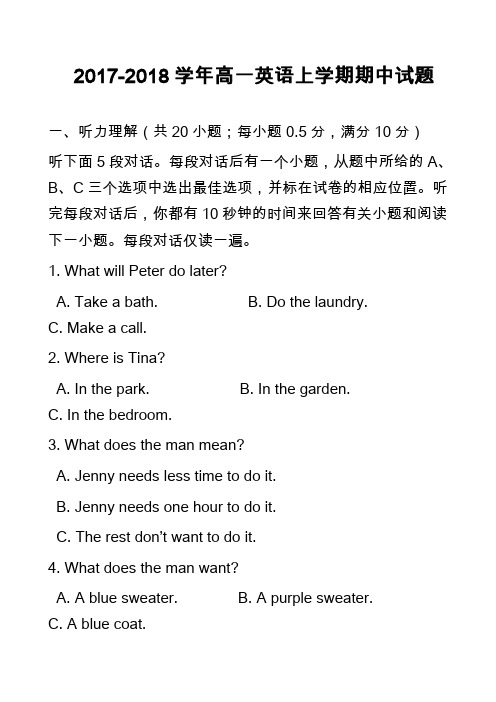
第一节:阅读下列短文,从每题所给的四个选项(A、B、C、和D)中,选出最佳选项,并在答题卡上将该项涂黑。
A
When you think of a typical American, whom do you picture? A pretty blond white American like Taylor Swift? Or a handsome black American like President Barack Obama or basketball star Kobe Bryant? In fact, there was a time when the average American lookedlike none of these people.
听第10段材料,回答第17至20题。
17. Where did Tomas leave his car?
A. Near a square. B. At a parking place. C. In a narrow street.
18. When did Tomas arrive?
A. At 4:20. B. At 4:40. C. At 5:00.
B. Jenny needs one hour to do it.
C. The rest don’t want to do it.
4. What does the man want?
A. A blue sweater. B. A purple sweater. C. A blue coat.
5. What does the man advise the woman to do?
9. When did the woman start her work today?
2017-2018学年上学期高一英语期中考试卷
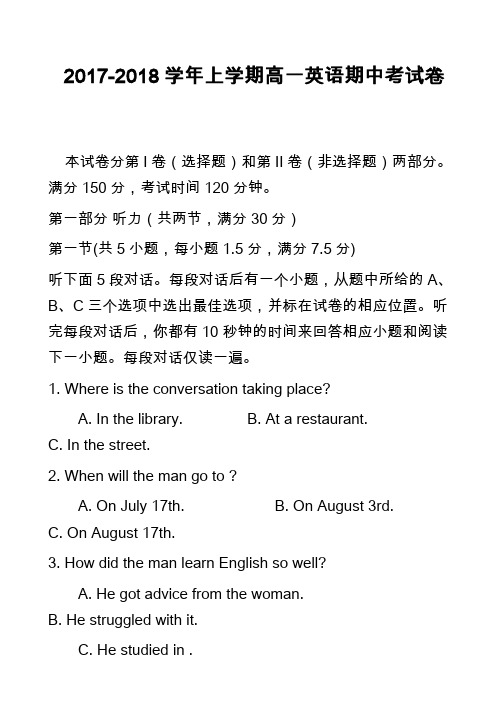
2017-2018学年上学期高一英语期中考试卷本试卷分第I卷(选择题)和第II卷(非选择题)两部分。
满分150分,考试时间120分钟。
第一部分听力(共两节,满分30分)第一节(共5小题,每小题1.5分,满分7.5分)听下面5段对话。
每段对话后有一个小题,从题中所给的A、B、C三个选项中选出最佳选项,并标在试卷的相应位置。
听完每段对话后,你都有10 秒钟的时间来回答相应小题和阅读下一小题。
每段对话仅读一遍。
1. Where is the conversation taking place?A. In the library.B. At a restaurant.C. In the street.2. When will the man go to ?A. On July 17th.B. On August 3rd.C. On August 17th.3. How did the man learn English so well?A. He got advice from the woman.B. He struggled with it.C. He studied in .4. Why does the woman refuse the popcorn at the cinema?A. It’s too salty.B. It’s too sweet.C. It’s too expensive.5. What music is George listening to?A. The Beatles.B. Jazz.C. Country music.第二节(共15小题;每小题1.5分,满分22.5分)听下面5段对话或独白,每段对话或独白后有几个小题,从题中所给的A、B、C三个选项中选出最佳选项,并标在试卷的相应位置。
听每段对话或独白前,你将有时间阅读各个小题,每小题5秒钟;听完后,各小题将给出5秒钟的作答时间。
广西桂林市高一英语上学期期中试题(new)

2017—2018学年上学期高一年级段考英语科试卷第I卷(选择题,共三部分,满分90分)第一部分:听力理解(共两节,满分30分)第一节(共5小题;每小题1。
5分,满分7。
5分)听下面5段对话。
每段对话后有一个小题,从题中所给的A、B、C三个选项中选出最佳选项,并把答案写在答题卡上相应位置。
听完每段对话后,你都有10秒钟的时间来回答有关小题和阅读下一小题。
每段对话仅读一遍。
1.When will the speakers meet?A.After the test。
B.Today after school。
C.On Friday after class.2.Who will have a party this weekend?A.The woman’s roommate.B.The man’s friend。
C.The woman。
3.What did the man do before lunch?A.He cleaned the car.B.He had a picnic.C.He visited his friends.4.Where does the woman want to have a picnic?A.By the lake。
B. In the mountains。
C. In her backyard (后院).5.What does the woman mean?A.The man should quit his job。
B.It’s unfair to the man.C.The man is lying.第二节(共15小题;每小题1。
5分,满分22。
5分)听下面5段对话或独白.每段对话或独白后有几个小题,从题中所给的A、B、C三个选项中选出最佳选项,并把答案写在答题卡上相应位置。
听每段对话或独白前,你将有时间阅读各个小题,每小题5秒钟;听完后,各小题将给出5秒钟的作答时间。
每段对话或独白读两遍。
2017-2018学年高一英语上学期期中试题_80

2017-2018学年高一英语上学期期中试题本试卷分第I卷(选择题)和第II卷(非选择题)两部分,共150分。
第I卷第一部分:听力(共两节,满分20分)第一节(共5小题;每小题1分,满分5分)听下面五段对话。
每段对话后有一个小题,从题中所给的A、B、C三个选项中选出最佳选项,并标在试卷的相应位置。
听完每段对话后,你都有10秒钟的时间来回答有关小题和阅读下一小题。
每段对话仅读一遍。
When will the gym open?A. At 7:00 a.m.B. At 7:30 a.m.C. At 8:00 a.m.What does the woman think about the weather on Saturday?A. Warm and sunny.B. Sunny but windy.C. Windy a nd cold.Where does the conversation most probably take place?A. At the train station.B. At the airport.C. At the bus station.What will Elizabeth do in Paris?A. To meet Patrick.B. For her holiday.C. To p ick up Patrick.What’s the possible relationship between the two speakers?A. Strangers.B. Neighbors.C. Friends.第二节(共15题;每小题1分,满分15分)听下面五段对话或独白。
每段对话或独白后有几个小题,从题中所给的A、B、C三个选项中选出最佳选项,并标在试卷的相应位置。
听每段对话或独白前,你将有时间阅读各个小题,每小题5秒钟;听完后,各小题将给出5秒钟的作答时间。
每段对话或独白读两遍。
2017-2018学年高一上学期期中考试(11月)英语试题
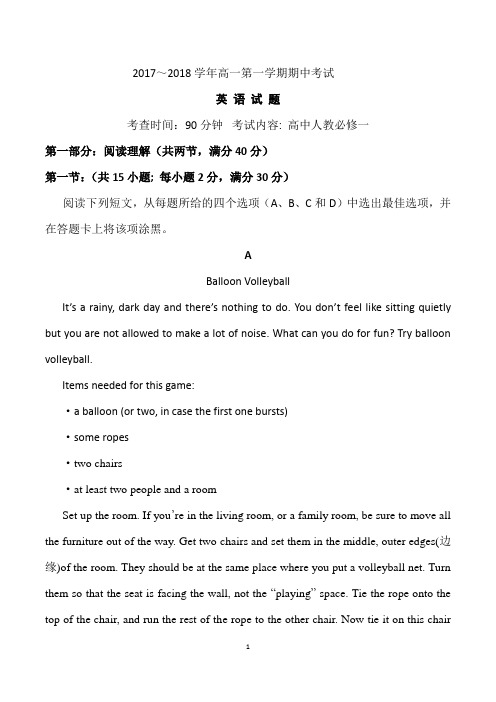
2017~2018学年高一第一学期期中考试英语试题考查时间:90分钟考试内容: 高中人教必修一第一部分:阅读理解(共两节,满分40分)第一节:(共15小题; 每小题2分,满分30分)阅读下列短文,从每题所给的四个选项(A、B、C和D)中选出最佳选项,并在答题卡上将该项涂黑。
ABalloon VolleyballIt’s a rainy, dark day and there’s nothing to do. You don’t feel like sitting quietly but you are not allowed to make a lot of noise. What can you do for fun? Try balloon volleyball.Items needed for this game:·a balloon (or two, in case the first one bursts)·some ropes·two chairs·at least two people and a roomSet up the room. If you’re in the living room, or a family room, be sure to move all the furniture out of the way. Get two chairs and set them in the middle, outer edges(边缘)of the room. They should be at the same place where you put a volleyball net. Turn them so that the seat is facing the wall, not the “playing” space. Tie the rope onto the top of the chair, and run the rest of the rope to the other chair. Now tie it on this chairat the same place as the first chair. You can decide the “out-of-bounds”(出界) lines, if you want to have them, but they really are not necessary in this game.Blow up the balloon. Choose sides. You will play this game on your knees (at least until they start hurting and you want to stand). Each side must get the balloon over the rope in three hits. If it does not get over, the other side gets the balloon and a point. This game becomes more difficult because you must play without talking.You can also add other rules to make it more difficult; for example, you can only use your left hand or only your right hand to hit the balloon.Continue playing until one side gets 10 points. You can make your game longer or shorter by changing the number of points it takes to win.This is a fun way to get your energy out, have fun, and not make too much noise on a rainy, stay-in-the-house day.1. What do we know about the balloon volleyball?A. One room is enough for it.B. It is played only indoors.C. It must be played quietly.D. At least two balloons are needed.2. What is the function of the chairs in this game?A. To make the playing area.B. To hold the rope up as the net.C. For the players to rest during breaks.D. For people to sit and watch the game.3. Which of the following rules can make the game harder?A. Play on knees.B. Play with a lot of noise.C. Use only your left hand to hit the balloon.D. Get the balloon over the ropein three hits.BRecently, I experienced a wonderful lesson in how little things still mean a lot. My brother, mother and I live in a very rural district of Hawaii. Our farm is at least a dozen miles from the most basic of services. Therefore, I take weekly trips to COSTCO to get supplies. About a month ago, I finished loading up the car and was about to leave, when a piece of paper caught my eye. I picked it up and read it carefully.It was a receipt(收据) from the State Motor Vehicle Division, recording the owner’s payment of her Vehicle’s Registration fees. At first I thought that I could find the owner. So I waited there for about an hour. Although the receipt had been borne (由……携带) on the wind, where in the busy, crowded parking lot would I find the owner? I looked over the receipt for contact or any personal data, perhaps a license tag(牌照)or telephone number. I checked the date, the fees paid, noted the name of the owner and pocketed the paper. I concluded that the best and easiest step to take was toBy the end of the week, I received a beautiful thank-you letter from a very grateful and happy woman containing a handwritten message and a gift card. In the letter, the woman explained how the wind snatched(夺去) her receipt from a pocket in her car’s passenger door. She had searched everywhere for quite some time before giving up.It felt great to know I’d helped someone avoid a loss by doing something that atfirst glance(一瞥) seemed little or even unimportant.4. What can we learn about the author?A. He lives downtown in Hawaii.B. He goes to the shop to get supplies once a week on foot.C. He is too poor to have basic supplies for his family.D. He is patient and willing to help others.5. The underlined word “it” in paragraph 2 probably refers to ______.A. the receipt B .the license tag C. the telephone number D. the personal data6. How did the woman feel when receiving the author’s envelope?A. Proud B . Disappointed C. Appreciated D. Angry7. What can be the best title for the text?A. A Lesson I Will Never ForgetB. Never Lose Heart or Give UpC. Little Things Still Mean a LotD. Think Carefully Before You ActCThe British are known for their sense of humor. However, it is often difficult for foreigners to understand their jokes. The main point to remember is that the British often use understatement.Understatement means saying less than you think or feel. For example, if someone gets very wet in a shower of rain, he might say, “Its a little damp (潮湿的) outside.”Or, if someone is very impolite and shouts at another person, someone else might say,“She isn’t exactly friendly.” Understatement is often used in unpleasant situation or to make another person look silly. Understatement plays an important part in British humor.Another key to understanding British humor is that the British like to make fun of themselves as well as others. They often laugh about the silly and unpleasant things that happen to our everyday life when someone accidently falls over in the street. They also like to make jokes about people from different classes of society. They like to make jokes about their accents, the way they dress and the way they behave. What’s more, the British love to watch comedies (喜剧) about people who do not know how to behave in society. The comedies series Mr. Bean is a good example of this kind of humor.Mr. Bean is the character created by British actor Rowan Atkinson in 1990. Mr. Bean doesn’t talk often, and instead he uses his body movement and facial expressions to make people laugh. Perhaps what makes Mr. Bean so funny is that he does things that adults in the real world cannot do. Mr. Bean is popular in many countries around the world because you do not have to speak English to understand the humor. Because of this, many people have become familiar with the British sense of humor.8. Why is it difficult for foreigners to understand British jokes?A. The British often enlarge the fact.B. British jokes are connected with many different cultures.C. British jokes are not as funny as jokes in other countries.D. The British try to make out that something is less important than it is.9. The author explains understatement by _______.A. describing a processB. making comparisonsC. following time orderD. using examples10. Mr. Bean makes laugh by ______.A. using his body movement and facial expressionsB. making jokes about others’ accentC. copying how others behaveD. telling funny stories11. What can be the best title for the text?A. British Humor in ComedyB. Humor in Different CulturesC. Understanding British HumorD. Developing Your Sense of HumorDHumans were designed to stand upright(直立). And yet in this modern world, too many of us spend our days with our heads lowered for a simple reason: we’re staring at the tiny screen of a smart phone.People spend an average of 2 to 4 hours each day with their neck bent whileThe average adult head weighs 10 to 12 pounds when it’s in the upright position. However, because of the gravity, bending your head at a mere 15 degree puts 27pounds of pressure on your spine(脊椎);a 30 degree neck bend could equal(等于) 40 pounds of pressure; a 45 degree bend adds the force of 49 pounds, according to the research from Dr. Kenneth Hansraj from New York. These stresses may lead to many problems.It’s no secret that correct posture is better for your back. According to the researchers, good posture is described as ears aligned(成一条直线) with the shoulders. In proper alignment, spinal stress disappeared. It is the best position for the spine. Standing tall doesn’t just make you look better; it improves your health, too. Other studies have found good posture has even been connected to ways of behaving. People who have poorer posture often have poorer physical and emotional health.The researchers describe bad posture(姿势)as “the head in a forward position and the shoulders dropping forward in a rounded position”. Bad posture has been connected to many medical problems, including headaches and other problems, depression and heart disease. This is why Hansraj said it’s important to be mindful of your smart phone posture. While it is nearly impossible to avoid the technologies that cause these problems, people should make an effort to look at their phones with a correct posture.12. Through the underlined sentence in paragraph 2, the author wants to show that _______.A. the social media have its bad sideB. the social media have made a great successC. people have to use social media unavoidablyD. more and more people areusing smart phones13. What does the third paragraph mainly tell us?A. It’s healthy to bend your back regularly.B. Your back is getting exercise as you bend it.C. The average weight of an adult head always changes.D. The more you bend your neck, the heavier the head becomes.14. What is the correct posture?A. Bend your head within 15 degrees.B. Raise and lower your head in turn.C. Drop your head forward in a rounded position.D. Keep the positions of the neck and shoulders in a line.15. Where does the text most probably come from?A. A text book.B. A health report.C. A research plan.D. A book review.第二节(共5小题;每小题2分,满分10分)根据短文内容,从短文后的选项中选出能填入空白处的最佳选项。
2017_2018学年高一英语上学期期中试题
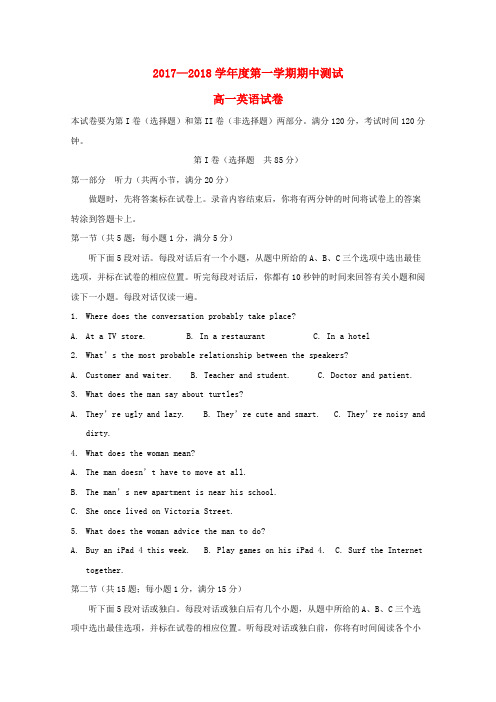
2017—2018学年度第一学期期中测试高一英语试卷本试卷要为第I卷(选择题)和第II卷(非选择题)两部分。
满分120分,考试时间120分钟。
第I卷(选择题共85分)第一部分听力(共两小节,满分20分)做题时,先将答案标在试卷上。
录音内容结束后,你将有两分钟的时间将试卷上的答案转涂到答题卡上。
第一节(共5题;每小题1分,满分5分)听下面5段对话。
每段对话后有一个小题,从题中所给的A、B、C三个选项中选出最佳选项,并标在试卷的相应位置。
听完每段对话后,你都有10秒钟的时间来回答有关小题和阅读下一小题。
每段对话仅读一遍。
1.Where does the conversation probably take place?A.At a TV store.B. In a restaurantC. In a hotel2.What’s the most probable relationship between the speakers?A.Customer and waiter.B. Teacher and student.C. Doctor and patient.3.What does the man say about turtles?A.They’re ugly and lazy.B. They’re cute and smart.C. They’re noisy anddirty.4.What does the woman mean?A.The man doesn’t have to move at all.B.The man’s new apartment is near his school.C.She once lived on Victoria Street.5.What does the woman advice the man to do?A.Buy an iPad 4 this week.B. Play games on his iPad 4.C. Surf the Internettogether.第二节(共15题;每小题1分,满分15分)听下面5段对话或独白。
2017-2018学年高一英语上学期期中试题_86
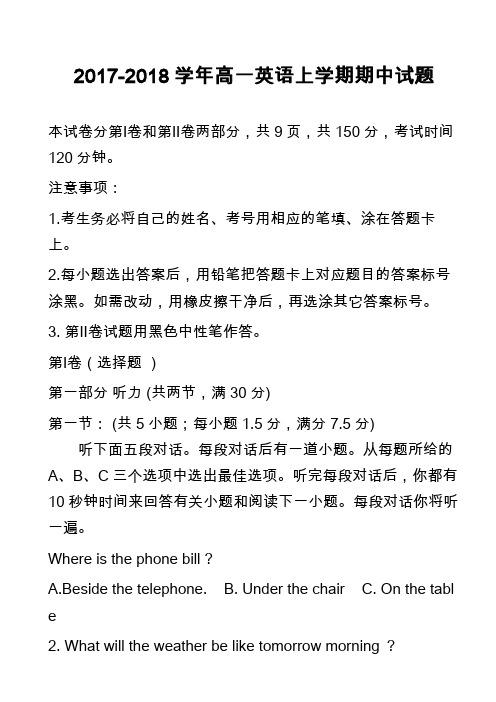
2017-2018学年高一英语上学期期中试题本试卷分第Ⅰ卷和第Ⅱ卷两部分,共9页,共150分,考试时间120分钟。
注意事项:1.考生务必将自己的姓名、考号用相应的笔填、涂在答题卡上。
2.每小题选出答案后,用铅笔把答题卡上对应题目的答案标号涂黑。
如需改动,用橡皮擦干净后,再选涂其它答案标号。
3. 第Ⅱ卷试题用黑色中性笔作答。
第Ⅰ卷(选择题)第一部分听力 (共两节,满30分)第一节: (共5小题;每小题1.5分,满分7.5分)听下面五段对话。
每段对话后有一道小题。
从每题所给的A、B、C三个选项中选出最佳选项。
听完每段对话后,你都有10秒钟时间来回答有关小题和阅读下一小题。
每段对话你将听一遍。
Where is the phone bill ?A.Beside the telephone.B. Under the chairC. On the tabl e2. What will the weather be like tomorrow morning ?A. SunnyB. WindyC. Rainny3. What are the speakers talking about ?A. An actorB. A teacherC. A role4. What did the woman do last night ?A. She went shoppingB. She attended a lectureC. She prepared for an exam5. When will the speakers go to the cinema ?A. On TuesdayB. On WednesdayC. On Thurs day第二节(共15小题;每小题1.5分,满分22. 5分)听下面5段对话或独白。
每段对话或独白后有几个小题,从题中所给的A、B、C三个选项中选出最佳选项,并标在试卷的相应位置。
听每段对话或独白前,你将有时间阅读各个小题,每小题5秒钟;听完后,各小题将给出5秒钟的作答时间。
2017-2018学年高一英语上学期期中试题_16

2017-2018学年高一英语上学期期中试题本试题分第I 卷(选择题)和第II卷(非选择题) 两部分。
全卷共150分,考试时间为120分钟。
第I卷第一部分:听力(共两节,满分30分)第一节(共5小题;每小题1.5分,满分7.5分)请听下面5段对话,选出最佳选项。
How old is the woman?A. 10.B. 18.C. 28.2. What does the man do now?A. An editor.B. A teacher.C. A journalist.3. When will the man go home?A. At noon.B. In the afternoon.C. In the evening.4. What will the speakers do for their mother’s birthday?A. Throw a party.B. Make a dress.C. Buy a gift.5. What are the speakers mainly talking about?A. Their CDs.B. Their hobbies.C. Their stamps.第二节(共15小题;每小题1.5分,满分22.5分)请听下面5段对话或独白,选出最佳选项。
请听第6段材料,回答第6、7题。
6. What will the woman do on Tuesday?A. Visit a farm.B. Have a picnic.C. Go to a villa ge.7. When will the woman go to the island?A. On Monday.B. On Wednesday.C. On Thursd ay.请听第7段材料,回答第8、9题。
8. When will the lecture end?A. At 3:30pm.B. At 4:00pm.C. At 4:30pm.9. What does the man want the woman to do?A. Study with him in the library.B. Help him with the homework.C. Take him to the lecture.请听第8段材料,回答第10至12题。
- 1、下载文档前请自行甄别文档内容的完整性,平台不提供额外的编辑、内容补充、找答案等附加服务。
- 2、"仅部分预览"的文档,不可在线预览部分如存在完整性等问题,可反馈申请退款(可完整预览的文档不适用该条件!)。
- 3、如文档侵犯您的权益,请联系客服反馈,我们会尽快为您处理(人工客服工作时间:9:00-18:30)。
2017~2018 学年度秋季学期期中考试试卷(高一英语)全卷满分150分,考试时间120分钟注意事项:1.本试卷由四个部分组成。
其中,第一、二部分和第三部分的第一节为选择题。
第三部分的第二节和第四部分为非选择题。
2.答卷前,考生务必将自己的姓名、准考证号填写在答题卡上。
3.回答选择题时,选出每小题答案后,用2B铅笔把答题卡上对应题目的答案标号涂黑;回答非选择题时,将答案写在答题卡上,写在本试卷上无效。
4.考试结束后,将本试卷和答题卡一并交回。
第一部分:听力(共两节,满分30分)第一节(共5 小题;每小题1.5 分,满分7.5 分)听下面 5 段对话。
每段对话后有一个小题,从题中所给的A、B、C三个选项中选出最佳选项,并标在试卷的相应位置。
听完每段对话后,你都有10 称钟的时间来回答有关小题和阅读下一小题。
每段对话仅读一遍。
1. How does theman feelabout themovie?A. Heonlylikes its story.B. Helikes it verymuch.C. Hedoesn’t likeit at all.2. What will theman do with his old computer?A. Sell it to thewoman.B. Giveit to his brother.C. Keep it himself.3. What’s theprobablerelationship between thetwo speakers?A. Mother and son.B. Brotherand sister.C. Teacher and student.4. What does theman eatat last?A. An apple.B. A banana.C. A pear.5. Whereis theman’s father?A.In thestudy.B.In thegarage(车库).C.In his room.第二节(共15 小题;每小题1.5 分,满分22.5 分)听下面5段对话或独白。
每段对话或独白后有几个小题,从题中所给的A、B、C 三个选项中选出最佳选项,并标在试卷的相应位置。
听每段对话或独白前,你将有时间阅读各个小题,每小题5秒钟;听完后,各小题将给出5秒钟的作答时间。
每段对话或独白读两遍。
请听第6 段材料,回答第6、7 题。
6. Whereis thelibrary?A. Behind thenew playground.B.In front ofthenew playground.C. Behind thenew teachingbuilding.7. What do weknow about Ann?A. Shedoesn’t likeswimming.B. Shehas acolorful collegelife.C. Sheworks reallyhardin college.请听第7 段材料,回答第8、9 题。
8. How longdid themanplayfootball this afternoon?A. Threehours.B. Fourhours.C. Fivehours.9. Whydidn’t themango fordinnerwith his friends?A. Becausehestill wanted to play.B. Becausehewas not hungry.C. Becausehewas too tired.请听第8 段材料,回答第10 至12 题。
10. How was theweatheryesterday?A. Hot.B. Cool.C. Cold.11. What did theman do yesterday?A. Hevisited afriend.B. Hestayed at home.C. Hewent swimmingwith a friend.12. What do weknow about theman?A. Hestill feelsterriblenow. B. Hefeelsveryhungrynow.C. Hehasn’t takenanypillsyet.请听第9 段材料,回答第13 至16 题。
13. When will theman leave forCanada?A. Next Monday.B. This Sunday.C. This Saturday.14. What’s theman worried about?A. How to makesomefriends.B. How togetalong well with others.C. How to makeothers understand him.15. What does thewoman think oftheman?A. Hard working.B. Easy-going.C. Outgoing.16. What do weknow about thewoman?A. Sheis afraid to introduceherselfto others.B. Shetries to rememberotherpeopl e’s names.C. Sheis bad at makingaconversation.请听第10 段材料,回答第17 至20 题。
17. How longhavethespeakerand Josh been friends?A. Overayear.B. About amonth.C. About halfayear.18. What didJosh want to do that day?A. Watch amovie.B. Go back to school.C. Watch his sist er’s performance.19. How did thespeakerfeel when his mothersawhim?A. Excited.B. Sad.C. Nervous.20. What did thespeakerlearn in the end?A. Josh was not agood friend.B. Friends needed timeoftheirown.C. Josh nolongerwantedto behis friend.第二部分:阅读理解(共两节,满分40分)第一节 (共15小题;每小题2分,满分30分)阅读下列短文,从每题所给的四个选项(A、B、C和D)中,选出最佳选项。
AOne day an old woman was traveling alone in the mountains. Suddenly she saw somethingshiningin thestream. When she cameclose, she found it was a precious(珍贵的)stone. Sheput thestoneinto herbagandwent onwith hertrip.Thenextdaytheoldwomanmetayoung man, whowasalsoatravelerinthemountains. Theyoung manlooked veryhungry,sotheoldwomanopenedherbag toshareherfood.The hungry travelersawthepreciousstoneandaskedcarefully,“Thestoneisbeautiful.Would you liketogiveit to me?”“Sure. Whynot?”thewom an said, and handed thestoneto him.Theyoungmanlefthappily withthestone.Heknewitwasworthenoughtogivehim securityforalifetime.Butafewdayslaterhecamebacktoreturnthestonetothewoman.“I’vebeenthinking,”hesaid.“I knowhowvaluablethestoneis,butIgiveitbackand hopethatyoucangivemesomethingevenmoreprecious.Givemewhatyouhavewithin yourbag.”Thewomanopenedherbag.Itwasalmostempty.Shelookedattheyoungmanand smiled, “Ihavenothingspecialinmybag,butIdohavesomethingprecious—thejoyofgiving!”Theyoung man felt ashamed and left silently.21. How did theyoungman find theprecious stone?A. He found it in his food.B. Hesaw it in thewoman’s bag.C. Hedugit out in avalley.D. Henoticed it shiningin thestream.22. What does theunderlined word “security”in Paragraph 4 probablymean?A. Health.B.Worry.C. Money.D. Trouble.23. Theman returned thestoneto thewoman because .A. he found thestonewas not preciousB. heunderstood thereal meaningofjoyC. he felt embarrassed at taking awaythestoneD. hewanted toget somethingeven moreprecious24. Which ofthe followingwould bethebest titleofthepassage?A. A special travelerB. ThejoyofgivingC. A woman and ayoung manD. An experiencein themountainsBAgroupofpeopleaskedthisquestiontoagroupof4-to-8-year-oldchildren.“Whatdoes lovemean?”The answers weresurprising.The children would answerliketheydid below.“Whenmygrandmotherhurtherknees,shecouldn’t bent(弯腰)overandpainthertoenails(脚指甲)anymore.Somygrandfatherdoesitforherallthetime,evenwhenhis hands hurt too.That’s love.”Rebecca–age8 “Loveiswhensomeonehurtsyou.Andyougetsomadbutyoudon’tshoutatthem becauseyou know it would hurt her feelings.”Samantha–age6“Loveis what makesyousmilewhenyou’r etired.”Terri–age4“Ilet mybig sister pickon(捉弄)mebecausemy mumsayssheonlypicksonmebecause sheloves me. SoIpick on mybabysisterbecauseIloveher.”Bethany–age4 “Iknowmyoldersisterlovesmebecauseshegivesmeallheroldclothesandhastogo out and buynew clothes.”Lauren–age4 “Loveis when Mommy gives Daddythebest pieceof chicke n.”Elaine–age5“Mymommylovesmemorethananybody.Youdon’tseeanyoneelsekissingmetosleep at nig ht.”Clear–age5 “Youreallyshouldn’tsay‘Ilovey ou’unl essyoumeanit.Butifyoumeanit,youshould sayit alot. People forget.”Jessica–age825.Thepassagemainlytells us about .A. what “life”m eans to childrenB. what“fa mily”m eans to childrenC. what “fr iends”m eansto childrenD. what “love”m eans to children26.What is love accordingtoTerri?A.Loveis the carebetween husband and wife.B.Loveis arest whenyou aresad.C.Loveis what cheersyou up whenyou aretired.D.Loveis akiss from parents.27.Who told us thelovebetween mum and dad?A. Clear.B. Elaine.C. Rebecca.uren.28.What does Jessicamean about love?A.Too much loveis no love.B.You should saylovemoreoften.C.You mean whatyou think.D. Saylovemoreoften ifyou haveit.CHaveyou everbeen toLondon?Hereis somehotel information foryou.Kingsway Hall HotelWeoffer qualityservice(优质服务)inKingsway HallHotel.Thislocationputsguests ineasy reachofmany places,suchastheBritishMuseumandPiccadillyCircus.Ourhotel alsohasmodernWesternfood,andoffersaperfectdining environment.Theloungebarisa comfortableplacetoenjoy adrinkwhilewatchingthetourists.Therearehundredsofdining choices within walkingdistance. Non-smokingrooms are readyforguests.HiltonDocklands RiversideLocatedonthe bankof the Thames,our hotelisabouttwomileseastof Tower Bridge and36milesfromLondonHeathrowAirport.Ourhotelhasabeauty salon,aflowershop andaswimming pool. Thehotelalsooffersdifferentkindsofservice:laundry(洗衣店) services, babysitting, shiningshoes, and local areatransportation.WindermereHotelLocatedinthecenterofLondon,ourhotelputsguestswithineasy reachofLondon’s well-knownbuildings. Buckingham Palace andthe Royal Parksare justa shortwalkaway. Within1.5milesyoucanvisitWestminsterAbbey andtheHousesofParliament.The theatres,Harrodsshoppingcentre,andthedesignershopsofSloane Squareand Knightsbridgeareall onlyashort walk awayorataxi ride away.29. What does KingswayHall Hotel provide forits guests?A. Chinese food.B. A loungebar.C. Smokingrooms.D. Aswimmingpool.30. What is special about Hilton Docklands Riverside?A.It offers different kinds ofservice.B.It offers areasonableprice.C.It hasconvenient transport.D.It has delicious food.31. This passageis most likelyto be found in .A. atravelguideB. astorybookC. atechnical reportD. ageographymagazineDWateris veryimportant to livingthings.Without watertherecan beno lifeon the earth.All animals and plants need water. Man also needswater. Weneed watertodrink, to cookourfoodandtocleanourselves.Waterisneededinoffices,factoriesandschools.Wateris neededeverywhere.Thereiswaterinseas,riversandlakes.Waterisfoundalmost everywhere.Eveninthe desert part oftheworld, thereis somewaterin theair. Youcan’t seeorfeelit when it is apart oftheair.Thewaterintheseas,riversandlakesisaliquid,thewaterintheairisagas,andwe call it watervapor (蒸汽).Cloudsaremadeofwater.Theymaybemadeofvery smalldropsof water.Theymay also bemadeofsnowcrystals(结晶体).Snowcrystalsarevery smallcrystalsofice.Iceisfrozen water.It is asolid.Therecan besnowand iceeverywherein winter.Watermaybeasolidoraliquidoragas.Whenitisasolid,itmay beashardasastone. When it is aliquid,you can drink it.When it is agas,youcan not seeorfeel it.32.Where canwe find water?A.We can find waterwhen it turns into vapor.B.Watercan befound almost everywhere.C.We can find waterin deserts here andthere. D.Wateris found onlyin seasandrivers.33. Clouds aremadeof .A. seas, rivers and lakesB. blocks oficeC. solid, liquid and gas34.Waterhas threestates(状态): .D. verysmall drops ofwaterorsnowcrystalsA. ice, snow andairB. solid, vapor, snowC. solid, liquid and gasD. drops ofwater, blocksofice andcrystals ofwater35.We can drink waterwhen it is .A. aliquidB. asolidC. in the airD. turned into ice第二节(共5小题;每小题2分,满分10分)根据短文内容,从短文后的选项中选出能填入空白处的最佳选项。
